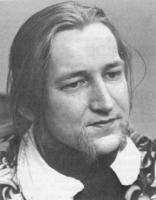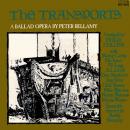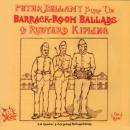It got beyond all orders an' it got beyond all 'ope;
It got to shammin' wounded an' retirin' from the 'alt.
'Ole companies was lookin' for the nearest road to slope;
It were just a bloomin' knock-out—an' our fault!
Now there ain't no chorus 'ere to give,
Nor there ain't no band to play;
An' I wish I was dead 'fore I done what I did,
Or seen what I seed that day!
We was sick o' bein' punished, an' we let 'em know it, too;
An' a company-commander up an' 'it us with a sword,
An' some one shouted “'Ook it!” an' it come to sove-ki-poo,
An' we chucked our rifles from us—O my Gawd!
Now there ain't no chorus 'ere to give,
Nor there ain't no band to play;
An' I wish I was dead 'fore I done what I did,
Or seen what I seed that day!
There was thirty dead an' wounded on the ground we wouldn't keep—
No, there wasn't more than twenty when the front begun to go;
But, Christ! along the line o' flight they cut us up like sheep,
An' that was all we gained by doin' so.
Now there ain't no chorus 'ere to give,
Nor there ain't no band to play;
An' I wish I was dead 'fore I done what I did,
Or seen what I seed that day!
I 'eard the knives be'ind me, but I dursn't face my man,
Nor I don't know where I went to, 'cause I didn't 'alt to see,
Till I 'eard a beggar squealin' out for quarter as 'e ran,
An' I thought I knew the voice an'—it was me!
Now there ain't no chorus 'ere to give,
Nor there ain't no band to play;
An' I wish I was dead 'fore I done what I did,
Or seen what I seed that day!
We was 'idin' under bedsteads more than 'arf a march away;
We was lyin' up like rabbits all about the countryside;
An' the major cursed 'is Maker 'cause 'e lived to see that day,
An' the colonel broke 'is sword acrost, an' cried.
Now there ain't no chorus 'ere to give,
Nor there ain't no band to play;
An' I wish I was dead 'fore I done what I did,
Or seen what I seed that day!
We was rotten 'fore we started—we was never disciplined;
We made it out a favour if an order was obeyed;
Yes, every little drummer 'ad 'is rights an' wrongs to mind,
So we had to pay for teachin'—an' we paid!
Now there ain't no chorus 'ere to give,
Nor there ain't no band to play;
An' I wish I was dead 'fore I done what I did,
Or seen what I seed that day!
The papers 'id it 'andsome, but you know the Army knows;
We was put to groomin' camels till the regiments withdrew,
An' they gave us each a medal for subduin' England's foes,
An' I 'ope you like my song—because it's true!
An' there ain't no chorus 'ere to give,
Nor there ain't no band to play;
But I wish I was dead 'fore I done what I did,
Or seen what I seed that day!
It got to shammin' wounded an' retirin' from the 'alt.
'Ole companies was lookin' for the nearest road to slope;
It were just a bloomin' knock-out—an' our fault!
Now there ain't no chorus 'ere to give,
Nor there ain't no band to play;
An' I wish I was dead 'fore I done what I did,
Or seen what I seed that day!
We was sick o' bein' punished, an' we let 'em know it, too;
An' a company-commander up an' 'it us with a sword,
An' some one shouted “'Ook it!” an' it come to sove-ki-poo,
An' we chucked our rifles from us—O my Gawd!
Now there ain't no chorus 'ere to give,
Nor there ain't no band to play;
An' I wish I was dead 'fore I done what I did,
Or seen what I seed that day!
There was thirty dead an' wounded on the ground we wouldn't keep—
No, there wasn't more than twenty when the front begun to go;
But, Christ! along the line o' flight they cut us up like sheep,
An' that was all we gained by doin' so.
Now there ain't no chorus 'ere to give,
Nor there ain't no band to play;
An' I wish I was dead 'fore I done what I did,
Or seen what I seed that day!
I 'eard the knives be'ind me, but I dursn't face my man,
Nor I don't know where I went to, 'cause I didn't 'alt to see,
Till I 'eard a beggar squealin' out for quarter as 'e ran,
An' I thought I knew the voice an'—it was me!
Now there ain't no chorus 'ere to give,
Nor there ain't no band to play;
An' I wish I was dead 'fore I done what I did,
Or seen what I seed that day!
We was 'idin' under bedsteads more than 'arf a march away;
We was lyin' up like rabbits all about the countryside;
An' the major cursed 'is Maker 'cause 'e lived to see that day,
An' the colonel broke 'is sword acrost, an' cried.
Now there ain't no chorus 'ere to give,
Nor there ain't no band to play;
An' I wish I was dead 'fore I done what I did,
Or seen what I seed that day!
We was rotten 'fore we started—we was never disciplined;
We made it out a favour if an order was obeyed;
Yes, every little drummer 'ad 'is rights an' wrongs to mind,
So we had to pay for teachin'—an' we paid!
Now there ain't no chorus 'ere to give,
Nor there ain't no band to play;
An' I wish I was dead 'fore I done what I did,
Or seen what I seed that day!
The papers 'id it 'andsome, but you know the Army knows;
We was put to groomin' camels till the regiments withdrew,
An' they gave us each a medal for subduin' England's foes,
An' I 'ope you like my song—because it's true!
An' there ain't no chorus 'ere to give,
Nor there ain't no band to play;
But I wish I was dead 'fore I done what I did,
Or seen what I seed that day!
inviata da Bernart Bartleby - 20/10/2017 - 13:36
...visto che il caro Bernart ha inserito a raffica (che imperdonabile parolaccia!) il povero Peter Bellamy di cui sentiamo ancora l'assenza, non posso esimermi dal ringraziarlo dedicandogli questa straziante perla (addirittura cover di Dylan) interpretata da par suo poco tempo prima dell'insano gesto.
https://www.youtube.com/watch?v=bzA_-GBBtlI
https://www.youtube.com/watch?v=bzA_-GBBtlI
Flavio Poltronieri - 20/10/2017 - 19:58
Grazie Flavio,
per fortuna artisti come Peter Bellamy non possono sottrarsi alla vita, vivono di nuovo e sempre...
When I Die
Ciao!
per fortuna artisti come Peter Bellamy non possono sottrarsi alla vita, vivono di nuovo e sempre...
When I Die
Ciao!
Bernart Bartleby - 20/10/2017 - 22:35
Lo sapevi che questa traduzione del 1916 di "Se" di Rudyard Kipling (recante il titolo di "Breviario per Laici)" è addirittura opera di Antonio Gramsci...
La traduzione di Gramsci era già presente in appendice a Lettera al figlio (Se) di Massimo Priviero
CCG/AWS staff
CCG/AWS staff
Flavio Poltronieri - 20/10/2017 - 23:02
People often used to register surprise when informed that I counted Peter among my friends. Neither of us ever made any secret of our political, social or philosophical views and they were about as far apart as you could get. But, even though I disagreed profoundly with many of his views, and he with mine, I respected the fact that he was prepared to defend them and argue his corner. He could also be extremely funny and was excellent company.
I also respected the integrity and single-minded determination which ran through his work. He did what he wanted to do and had no interest in altering his approach or the content of his work in order to seek popularity. He spent his life in the place Hugh MacDiarmid called "where extremes meet", the place where I believe all artists should live.
His love of traditional song was clear but he did not place the tradition on any pedestals. He understood that it is a living process of evolution and development and he played a major part in contributing to that process. Like any serious artist, he was able to break all the rules because he had a profound understanding of them and knew what they were for.
One of my fondest memories is of the night at Norwich Festival where he introduced me to Walter Pardon and had to act as interpreter as neither Walter nor myself could understand a word the other said.
Many others will passionately disagree but it is my belief that Peter never quite produced the masterpiece which his talents suggested; he came close on many occasions but always gave the impression that each was just another step on the road to truly finding his real voice. I have a suspicion that frustration with this search may have played a part in his death.
I met him first in 1966 and the last time I met him was about 6 months before he died. I am left with memories of late-night intense debates where neither of us took prisoners and of a man who walked his own road. I liked him and I respected him and I wish he'd stuck around a bit longer.
Dick Gaughan, about Peter Bellamy
I also respected the integrity and single-minded determination which ran through his work. He did what he wanted to do and had no interest in altering his approach or the content of his work in order to seek popularity. He spent his life in the place Hugh MacDiarmid called "where extremes meet", the place where I believe all artists should live.
His love of traditional song was clear but he did not place the tradition on any pedestals. He understood that it is a living process of evolution and development and he played a major part in contributing to that process. Like any serious artist, he was able to break all the rules because he had a profound understanding of them and knew what they were for.
One of my fondest memories is of the night at Norwich Festival where he introduced me to Walter Pardon and had to act as interpreter as neither Walter nor myself could understand a word the other said.
Many others will passionately disagree but it is my belief that Peter never quite produced the masterpiece which his talents suggested; he came close on many occasions but always gave the impression that each was just another step on the road to truly finding his real voice. I have a suspicion that frustration with this search may have played a part in his death.
I met him first in 1966 and the last time I met him was about 6 months before he died. I am left with memories of late-night intense debates where neither of us took prisoners and of a man who walked his own road. I liked him and I respected him and I wish he'd stuck around a bit longer.
Dick Gaughan, about Peter Bellamy
B.B. - 23/10/2017 - 08:00
×
![]()








Versi di Rudyard Kipling, nella raccolta intitolata “Barrack-Room Ballads”, pubblicata nel 1892.
Musica di Peter Bellamy, in una musicassetta inedita intitolata “Soldiers Three”, realizzata nel 1990. Poi il brano è stato incluso nella riedizione del 2012 del disco “Peter Bellamy Sings the Barrack-Room Ballads of Rudyard Kipling”, originariamente pubblicato nel 1976
Testo trovato su Mainly Norfolk: English Folk and Other Good Music
La poesia racconta della battaglia di Maiwand, località nella provincia afghana di Kandahar, combattuta il 27 luglio 1880 tra gli invasori britannici e le tribù afghane guidate da Ghazi Mohammad Ayub Khan, governatore di Herat. Le truppe inglesi, costituite da circa 2.500 uomini, furono accerchiate dai combattenti afghani in numero 10 volte superiore, i quali morirono come mosche ma inflissero agli invasori quasi 1.000 morti, vincendo la battaglia e fermando definitivamente la penetrazione britannica in Afghanistan. Infatti, benchè nel settembre del 1880 gli inglesi avessero vinto a Kandahar, i costi di quella spedizione erano stati comunque troppo alti e l’anno seguente abbandonarono il progetto, ritirando tutte le truppe dall’Afghanistan.
La battaglia di Maiwand è per gli inglesi ciò che la battaglia di Little Big Horn rappresenta per gli statunitensi…
E va anche considerato che, mentre i nativi americani, hanno smesso di combattere ormai da un secolo, invece gli afghani sono ancora lì.